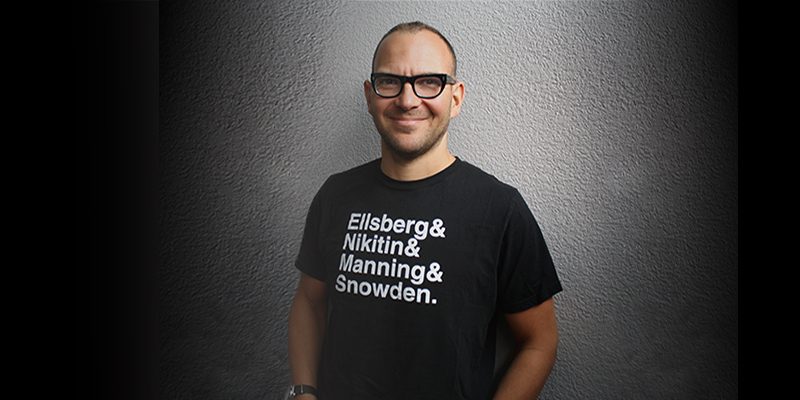Cory Doctorow: Libraries and E-books
 At the start of the summer, I traveled to Chicago for the annual national conference of the American Library Association. It was great. There are many utterly baseless clichés about librarians – the shushing spinster who prefers the company of books to humans is a creation of pure and unimaginative fantasy. But there is one way in which librarians live up to their reputation: they are superbly organized. I’ve been to many library conferences – national, regional, even Europe-wide – and the one thing I can report about all of them is that they ran like clockwork.
At the start of the summer, I traveled to Chicago for the annual national conference of the American Library Association. It was great. There are many utterly baseless clichés about librarians – the shushing spinster who prefers the company of books to humans is a creation of pure and unimaginative fantasy. But there is one way in which librarians live up to their reputation: they are superbly organized. I’ve been to many library conferences – national, regional, even Europe-wide – and the one thing I can report about all of them is that they ran like clockwork.
While I was in Chicago, I sat down with some of the ALA strategists to talk about how libraries are getting a raw deal on e-books. When libraries want to buy an e-book from the publisher, they find themselves paying as much as five times the price you or I pay for the same book. Literally – librarians are paying $60-80, and sometimes more, to include current release frontlist titles in their collections. Each of these e-books can only be lent to one patron at a time, which means that libraries are sometimes buying a dozen – or more – of these overpriced text-files.
Not only that, but libraries have to buy these books with DRM on them, and invest in expensive, proprietary collection-management software from companies like Overdrive in order to ensure that only one patron at a time can check out any given e-book. These e-books come with restrictions that don’t appear on regular print books; they can’t be sold on as used books once their circulations drop below a certain threshold; neither can they be shared with another library’s patrons though standard practices like interlibrary loan, a mainstay of libraries for more than a century.
To add insult to injury, HarperCollins insists that libraries delete their e-books after they are circulated 26 times. This has been pitched as having some parallel to the fact that many library books eventually disintegrate and have to be discarded. But this is both wrong and perverse. Wrong because the 26-circulation cutoff bears no relationship to how many times a book can circulate before it falls to bits. It amazes me to think that HarperCollins wants to frame its products as so badly manufactured that they can’t withstand being read 27 or more times. But beyond the factual problems with a 26-circ cap, there is the fundamental perversity of celebrating and importing the limitations of physical media into the digital world. It’s like insisting that electric bulbs be limited to outputting no more than one lumen of light, since that’s all a comparably-sized candle would manage. The fact that books don’t last forever is not a feature to be preserved through the digital transition: it’s a bug, and the sooner we eliminate it, the better.
The ALA has launched a program called Authors for Library E-books, through which authors like me (and you) can sign onto a call to their publishers to give libraries fair and equitable access to e-books. If you’re interested in signing up, you can find the campaign at http://www.ala.org/transforminglibraries/a4le.
Publishing is in the midst of a transition in which publishers are ceding ever-larger parts of their business to e-book vendors, companies like Apple, Google, and Amazon. At the same time, the world of retail print book sales has gone through enormous contractions, and Barnes and Noble, the last remaining major chain, is on shaky ground. Lots of plucky indy booksellers are hanging in across the country, and we love them, but they have a diffused voice and diffused influence.
Not so libraries. There are libraries in every town, and even though they’re under terrible assault in the age of austerity, they remain the mark of a civilized society and benefit from librarians’ amazing organizational skills. The modern library has become something like a bookstore, where helpful staff who love books and authors take enormous pride in ‘‘hand-selling’’ the publishers’ products to their patrons. Libraries host some of the best author events, too, providing a vital space for readers and writers to connect.
Unlike every other channel for e-books, libraries are not the publishers’ competitors. They don’t want to sell devices. They don’t want to win over customers to a particular cloud. They just want readers to read, writers to write, and publishers to sell. They deserve a better deal than they’re getting.
There’s a good case to be made for libraries getting discounts on e-books, rather than paying premiums. For one thing, they’re excellent customers and they make bulk-buys. For another, the e-books that libraries buy stay in their collection forever, unlike print books. When a library downsizes its stock of last-year’s print bestseller, it puts most of its copies in its booksale for a nominal sum, a dollar or two, and often those books end up in the used-book stream, being sold alongside the new books on Amazon at steep discounts, competing for readers’ dollars.
But e-books can’t be sold in the booksale. They don’t ever end up competing with new books – and they never generate revenue for libraries as used books. That is, even when priced at par, e-books make more money for publishers and less money for libraries.
Publishers should be courting libraries as neutral parties and potential allies in the e-book wars. Publishers are in direct competition with e-book companies like Amazon, who publish e-books as well as selling them. But when Amazon sells an e-book, it gets mountains of business intelligence from the transaction: who is buying, where, from which keywords, and with what other books (for starters). What does the publisher get? An aggregate sales figure, 90 days after the fact. Of course Amazon is running circles around the Big Five publishers: the publishers know nothing about their customers, and Amazon knows everything about them.
Library e-book circulation data is a source of potentially priceless, actionable business intelligence for the publishers, if they can stop focusing on gouging libraries on price and focus on cooperating with them instead. Libraries could provide publishers with daily circulation figures, broken down by city, for every book, along with correlations between books (‘‘this book was checked out with that book’’). Provided the data is sufficiently aggregated, it would not pose a risk to individual patron privacy. This has to be managed carefully, of course, but if there’s one group that can be relied upon to treat this issue with the care it is due, it’s librarians.
The age of austerity has not been kind to libraries, and in many places they are the last ‘‘storefront’’ that still tries to put books into the hands of readers. Treating them like a captive market to be exploited is a huge – and potentially fatal – mistake on the part of publishers. If publishers wanted to get something truly valuable out of libraries, they could do no better than to help create a free, open alternative to Overdrive that gives them the data they need to compete with the e-book retailers and frees the libraries from their expensive circulation-management burdens.
I hope they’ll see the light. Like so many writers, I owe my love of books to libraries and never feel more at home than when I’m in a great library. The last thing I want is for my books to be a burden to the librarians who love them and do all they can to find readers for them.
Cory Doctorow is the author of Walkaway, Little Brother, and Information Doesn’t Want to Be Free (among many others); he is the co-owner of Boing Boing, a special consultant to the Electronic Frontier Foundation, a visiting professor of Computer Science at the Open University and an MIT Media Lab Research Affiliate.
From the September 2013 issue of Locus Magazine







There are some forward thinking publishers like Red Wheel Wiser, and The History Press who are putting collections of their books into digital anthologies that libraries can purchase on an unlimited multi-user basis. They are embracing the Readers First initiative, as more publishers should do.
…this was thoughtful , imaginative, and original. thank you.
As a librarian I support and approve of this message. All I want is to help readers find stories, music and media they will love.
E-books offer huge advantages to those with print impairment, liberating the market to many more users and extending the age-range of readers (older readers having more book time too). Publishers should be thinking about extending the size of the reading ‘cake’ rather than fighting for a bigger slice of it. http://www.jisctechdis.ac.uk/techdis/technologymatters/ebooks
Cory, what can self-published authors do to help? I’m happy to make my books available at reasonable prices, and DRM-free, but it’s not clear how I would do so.
Even worse, a fair proportion of the eBooks available through my local library are Overdrive copies of books available through the public domain through Project Gutenberg and the like. So they’re probably paying through the nose for something they could have encouraged people to go get for themselves.
You make a good point about importing paper properties/restrictions into a digital world. From the days of the horseless carriage to now, the first phase of technology innovation is to copy the old into the new. It takes a while to then fully explore the freedoms of the new technology.
In this respect, is “digital lending” not just a digital version of a paper concept? E-book lending by libraries is an attempt to fit a new technology in the existing library-publisher business model.
Libraries should focus on encouraging the production of free content through open-access initiatives.
http://scitechsociety.blogspot.com/2012/04/annealing-library.html
Perspective: I’m a retired public library director. Part of the issue here is library dependency on big publishers … we rely far too much on publishers weeding out manuscript chaff and providing library reviewers with free copies. The result is ignorance of good self-published (or small press published) material, a category now growing with both the ease of e-publication and authors’ desires to capture a greater percentage of the price. In my view, one thing libraries should do is work with self-published authors and make their work available through a $1 per circulation fee. Authors would retain copyright, of course, and still be able to sell individual copies at whatever price they might choose. The single greatest ignorance held by traditional publishers is how much publicity public libraries provide authors (we have people dedicated to helping readers find new books … only the very best bookstores had the same). IMHO, public libraries should use this strength to help readers find authors who wish to bypass publishers. Those authors wishing to bypass publishers (and contracts) might find that they have an easy choice.